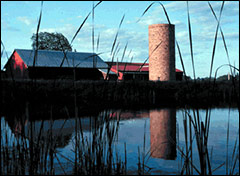health
-
Umbra on bleach
Greetings, I recently was infected with MRSA. It got better. As part of my treatment I’m supposed to use bleach in my laundry and around the house to help kill the bacteria. While I’m brunette, I feel like the stereotypical blonde about bleach. What are the environmental impacts of this chemical? Thanks, Emily Indiana Editor’s […]
-
Ignorance isn’t bliss, it’s just better than knowing
It's well known in environmental advocacy that people can easily be overwhelmed by problems. They wind up feeling paralyzed rather than motivated. I've always treated this as a theoretical point about communications, but I've had to admit that I'm an example. Here's how.
Mountain Equipment Co-op, (aka "the REI of Canada"), just pulled from shelves a batch of polycarbonate plastics, including those ubiquitous Nalgene bottles. According to an article in the Globe and Mail:
-
NYT on the surge in E. coli outbreaks
"There’s shit in the meat," declared a harried fast-food exec in the Richard Linklater / Eric Schlosser film Fast Food Nation. Well, yes, there is — and more this year than in past years, judging from the number of recalls of beef tainted with the deadly E. coli strain 0157. In an article in yesterday’s […]
-
In the clash over school lunches, who’s watching out for the kids?
The following is a guest essay by Kate Adamick, a New York-based consultant and lecturer on matters relating to school food reform and an advisor to the Orfalea Fund in Santa Barbara, Calif.; and Ann Cooper, the “Renegade Lunch Lady” and director of nutrition services for the Berkeley Unified School District. —– A friend of […]
-
New study finds that pollution from ships kills 60,000 a year
It's surprising how much pollution ships emit: over 2,000 tons of diesel soot a year in southern California, for example, about 10 percent of the total in the region.
Worse, a new study by researchers at the University of Delaware and Rochester Institute of Technology finds that the burning of cheap, dirty, sulfurous "residual oil" on ships kills an estimated 60,000 people around the world. "Premature mortality" is the phrase used in the study.

Annual average contribution of shipping to (particulate matter) PM<sub>2.5</sub> concentrations for Case 2b (in µg/m3). Copyright © 2007 American Chemical Society(h/t: The Blue Marble)
-
Organic food is better for you
For years, studies showed no nutritional difference between organic and conventionally grown food. That’s because scientists were looking at macronutrients — vitamins A, B, C, and so on. But they’ve since learned that macronutrients are only part of the nutrition story. It turns out that there are all sorts of compounds like antioxidants and phytonutrients […]
-
Notable quotable
“Well, there are public health benefits to climate change, as well, both benefits and concerns …” — White House spokeswoman Dana Perino
-
Umbra on Halloween
Dear Umbra, We really enjoy the community aspect of trick-or-treating but we don’t want to give out candy to the little ones, or toxic plastic Chinese toys. Two hundred kids come to our house every Halloween. How do we keep it green, safe, and economical? Jodi McMillian Charleston, W.Va. Dearest Jodi, Two hundred children? How […]
-
How the nation’s breadbasket is poisoning its own water supply
In late September, the corn and soybean fields of the lower Missouri River floodplain are a lovely dull brown, nearly ready for harvest. The row crops sprawl as far as the eye can see, their regimental march broken only by levees, gravel roads, the occasional band of cottonwoods, and the endless tracks of the Burlington […]
